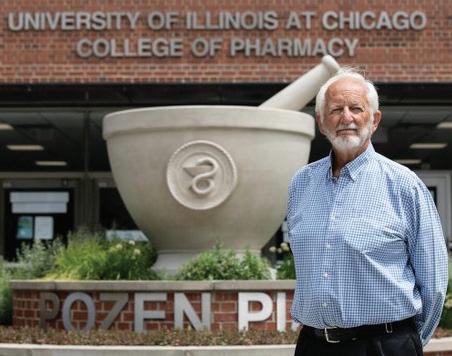CITIZEN | Chicago Weekend | Week of Aug. 26, 2020
|
3
NEWS
Contraceptive offers new option for women A first-of-its-kind contraceptive developed at the University of Illinois Chicago has been approved by the U.S. Food and Drug Administration. The new contraceptive, called Phexxi, is a non-hormonal vaginal gel that can be used on-demand to prevent pregnancy. The contraceptive is the fourth drug developed by researchers at UIC to achieve FDA approval. This milestone solidifies the university’s role as a leader in innovation and drug development in Chicago, according to UIC Vice Chancellor for Innovation TJ Augustine. “This is a great examDon Waller stands outside the College of Pharmacy building on Tuesday, Aug. 4, 2020. ple of UIC’s tremendous Joshua Clark/University of Illinois Chicago strength in drug disto penetrate the egg parallel the multi-drug resistant HIV, was covery and innovation, ability of pathogens to infect cells,” approved by the FDA in 2006. Its building on the success of the Waller said. development was led by UIC’s Arun other three UIC-developed drugs Waller said that semen, when Ghosh, from the College of Liberal on the market. It really illustrates introduced into the vagina, has the Arts and Sciences, in collaborathat our faculty members not only effect of neutralizing the natural de- tion with the National Institutes conduct groundbreaking research, fenses of the vagina. This neutralizof Health. In 2011, UIC and the but are also passionate about ing effect maintains sperm viability NIH donated the patent rights to taking that research to the point Medicines Patent Pool, a United where it can have a positive impact and also lowers the vagina’s natural barriers against infections. Nations-backed public health orgaon people’s lives,” Augustine said. “With this formulation — which nization that grants licenses for geThe gel — which is a combirelies on common non-hormonal neric manufacturing and purchasnation of lactic acid, citric acid ingredients like lactic acid — we ing of therapeutics to encourage and potassium bitartrate —works found a way to use one of the improved access and affordability by keeping vaginal pH levels in a in developing countries. The drug is range that is inhospitable to sperm. vagina’s natural defenses: its acidic pH,” Waller said. licensed to Janssen Therapeutics. UIC’s Donald Waller developed Waller’s gel, which is co-patentUsing the royalty income genthe contraceptive in collaboration ed by UIC and Rush, was licensed erated by the Prezista patent, the with Lourens Zaneveld of Rush to Evofem Biosciences, Inc. in college has established four new University Medical Center. Devel2003. Evofem developed the gel for endowed chairs in order to recruit opment of the contraceptive gel commercial use through clinical and retain highly accomplished began more than 20 years ago. trials and FDA approvals. natural sciences faculty. “The driver behind this innovaAccording to an Evofem news Shingrix was approved by the tion was to provide women with release, Phexxi is expected to hit FDA in 2017 as a vaccine against more control and more options for the market early next month, shingles, a form of chickenpox in safely preventing pregnancy and alongside a telehealth program to adults. Its development was origisexually transmitted infections,” support access for women. nated by UIC’s Abbas Vafai, from said Waller, professor of pharmaWaller said the FDA’s approval the College of Medicine, before a cology and toxicology at the UIC of Phexxi shows the strength of the third party under contract with the College of Pharmacy. “There are concept that inspired the gel. university licensed the vaccine to many women who feel that hor“There is a need for in-thepharmaceutical company GSK. monal, long-acting birth control moment options that give women Tice BCG, originally a vaccine is not a viable option, and there control, and I think many women for tuberculosis, was approved in are women who struggle to access will appreciate that such an option 1990 for the treatment of bladder prescription or implanted birth does not rely on steroid horcancer. Its original development control due to lack of insurance or mones,” Waller said. “My hope is as a TB vaccine was led by UIC’s access to health care. that women feel empowered with Sol Rosenthal, from the College of “We started by looking at options to protect themselves.” Pharmacy, before the university natural defenses — both against Phexxi joins Prezista, Shingrix contracted exclusive manufacturpregnancy and against pathogens, and Tice BCG in UIC’s portfolio of ing rights to the immunotherapy such as gonorrhea and other FDA-approved therapies. to Organon Teknika, a subsidiary STDs. We found that many of the Prezista, the first treatment for of Merck. mechanisms that allow sperm www.citizennewspapergroup.com
Because phishing emails are so common and successful, Summit partners urge tax professionals to educate all office personnel about the dangers and risks of opening suspicious emails – especially during the COVID-19 period.
Working Virtually: Avoid phishing scams The Internal Revenue Service and the Security Summit partners are warning tax professionals to be alert to new phishing scams that try to take advantage of COVID-19, Economic Impact Payments and increased teleworking by practitioners. The IRS, state tax agencies and the nation’s tax industry urged tax firms to review and heighten their data protection plans this summer as cybercriminals step up efforts to steal client tax information. Crooks are targeting tax professionals as well as taxpayers. Avoiding phishing emails is the fourth in a five-part Security Summit series called Working Virtually: Protecting Tax Data at Home and at Work. The Security Summit initiative by the IRS, state tax agencies and private-sector tax industry spotlights basic security steps for all practitioners, but especially those working remotely in response to COVID-19. “The coronavirus has created new opportunities for cybercriminals to use email to try stealing sensitive information,” said IRS Commissioner Chuck Rettig. “The vast majority of data thefts start with a phishing email trick. Identity thieves pose as trusted sources – a client, your software provider or even the IRS – to lure you into clicking on a link or attachment. Remember, don’t take the bait. Learn to recognize and avoid phishing scams.” Phishing emails generally have an urgent message, such as your account password expired. They direct you to an official-looking link or attachment. The link may take you to a fake site made to appear like a trusted source and request your username and password. Or, the attachment may contain malware, which secretly downloads malware that tracks keystrokes and allows thieves to eventually steal all the tax
pro’s passwords. This year, IRS identified a highly sophisticated attack against tax firms where thieves gained remote access either through phishing or malware and were able to enter the cloud storage accounts that held client files. In one case, thieves spent 18 months quietly downloading and accessing taxpayer information before they were discovered. The Department of Homeland Security’s Cybersecurity and Infrastructure Security Agency (CISA) recently issued a warning to all organizations to educate employees, especially those teleworking, about increased activity related to phishing scams. These scams focused on COVID-19 fears by presenting themselves as providers of face masks or personally protective equipment in short supply. Thieves also used other tactics against taxpayers, impersonating the IRS and calling or emailing requests for bank account information to send the Economic Impact Payments. Tax professionals should beware of emails from criminals posing as potential clients. As people practice social distancing these days, criminals may exploit this process to try to trick tax practitioners into opening links or attachments. The Security Summit continues to urge tax professionals to create “trusted customer” policies, and contact potential clients by phone or video conference. Taxpayers and tax preparers can forward suspicious emails posing as the IRS to phishing@irs.gov. Because phishing emails are so common and successful, Summit partners urge tax professionals to educate all office personnel about the dangers and risks of opening suspicious emails – especially during the COVID-19 period.




